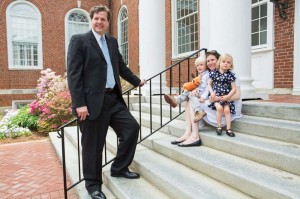In this issue of the magazine, you’ll read, among other things, about Commencement 2015. It’s always a spectacular day, but this year was especially so. Under perfect weather, the great historian Doris Kearns Goodwin graced us with an inspiring speech about Abraham Lincoln. I was proud (if a little sore) to have shaken the hands of 818 new graduates that morning (and another 140 graduate students the evening before).
 Commencement marks an end, of course, but also new beginnings—long, winding, wondrous and unpredictable adventures. You’ll also read in the magazine, as always, about a few alumni who are engaged in especially remarkable citizen leadership.
Commencement marks an end, of course, but also new beginnings—long, winding, wondrous and unpredictable adventures. You’ll also read in the magazine, as always, about a few alumni who are engaged in especially remarkable citizen leadership.
Years ago, as they walked across the stage at their own graduation ceremonies, they could not have precisely envisioned the paths they would follow. Yet their Longwood education has served them well, just as it will serve well our newest graduates.
The key ingredients are twofold. First, regardless of a student’s major, there’s a firm foundation in the liberal arts and sciences. These are the skills and habits of mind that are essential for democratic life. But what’s less often appreciated is that they are also precisely the skills that employers consistently report they seek in new hires.
Employers tell us they can teach workers new skills, but they can’t teach them how to learn. They want employees who can write clearly, who can evaluate problems and solve them, and who can work with a diverse group of colleagues. Today’s new college graduates are likely to change careers repeatedly and to have jobs in the future that today aren’t even known to exist. We know that the United States has consistently reinvented itself as the world’s most innovative economy precisely because of our strong tradition in the kind of education that never becomes obsolete.
There is also, of course, a practical dimension to the higher education demanded by the 21st-century economy. That’s why every Longwood student completes an internship or research project. Research is the cornerstone of the Quality Enhancement Plan (QEP) that will shape our academic priorities in the coming years. It helps students dive into specific problems, developing close relationships with faculty mentors, and provides an important dimension of preparation for the workforce and/or graduate school. Research is one reason that Longwood’s campus has become so busy and vibrant during the summer months. This summer, 14 undergraduate students are participating in a program that pairs them with faculty for an eight-week research partnership.
In the coming years, we will work hard to strengthen both of these core elements of a Longwood education for future generations. A committee of leading faculty is carefully reviewing our general education curriculum to identify and build the essential and distinctive academic experiences we will ask of every Longwood student. Increasing opportunities for our students to engage in research will also be a top priority, and we will be reaching out to you and others in the greater Longwood community for your help supporting those efforts.
The world is indeed changing rapidly. But a Longwood education allows our new graduates to embrace change—to view it as a constant opportunity, not a threat. That is an invaluable gift. It is one we have provided for 176 years now, and we are determined to continue to provide it in the years and centuries to come.
Thank you and my best,

W. Taylor Reveley IV
President
